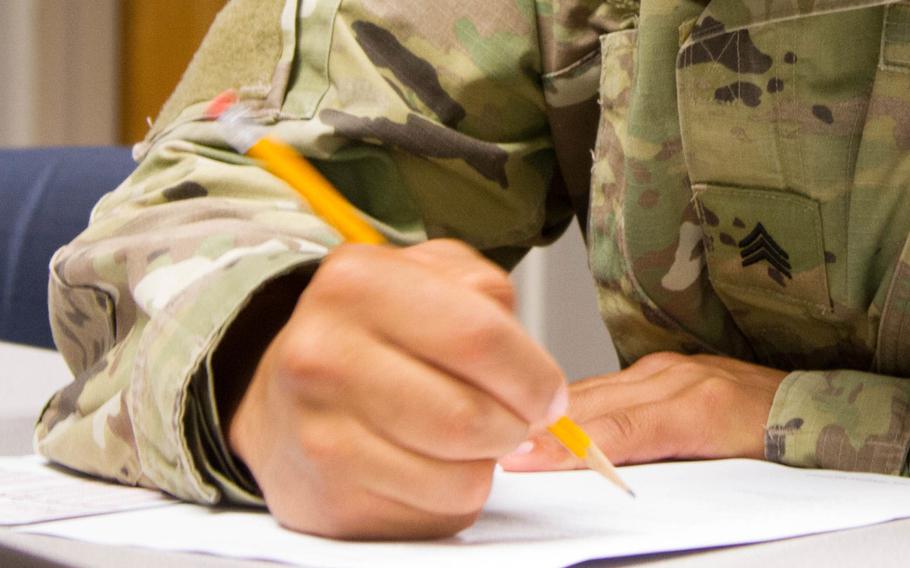
A soldier takes a written exam on June 20, 2016 at Fort Hood, Texas. (Marcus Floyd/U.S. Army)
WASHINGTON — Schools approved for the GI Bill received $247.6 million more than they should have during the 2013-2014 academic year, according to a report released Friday from the Department of Veterans Affairs inspector general’s office.
The post-9/11 GI Bill paid out $5.2 billion for 796,000 veterans to go to school from 2013 to 2014, the report states. However, about 5 percent of the payments were made in error, costing $247.6 million in overpayments. An additional $205.5 million was not recouped when students withdrew from school or dropped a class or repeated courses, making the veterans ineligible for the benefit that was already paid.
The IG report concluded the design of the post-9/11 GI Bill program made it “susceptible” to doling out improper payments.
If the program isn’t fixed, the report states, the Veterans Benefits Administration, which administers the program, could issue $1.2 billion in overpayments in the next 5 school years and fail to recover about $1 billion.
VA officials disagree.
The inspector general’s office made its estimates after reviewing $1.7 million in tuition and fees paid to 50 schools on behalf of 225 students. In that sample, inspectors found 46 improper payments.
In a response to the report, the VA’s office of the undersecretary for benefits said the errors were far fewer. In its own review, the VA found five improper payments in the same sample.
“VBA does not agree with the findings of the Office of Inspector General related to the number and amounts of improper payments or missed recoupments – or the estimates that were derived from the OIG’s sampling results,” the response states.
The disagreement rests with who is accountable for checking information about tuition and fees.
According to the IG report, the GI Bill program relies on school officials to submit information about tuition and fees, and those submissions comprise only “minimal” information, including a student’s name, educational program, enrollment date and the total payment due.
“VBA must issue payments prospectively due to program design and rely on information provided by third parties,” the report reads. “It does not include an itemized list of the tuition and fees the schools are charging, so VA cannot identify the specific tuition amount, services or school supplies the school is charging VA.”
VA officials argued it was not the responsibility of their staff to verify whether the submissions were correct before processing a payment.
If staff were to examine each claim for payment as thoroughly as the IG did for its report, “the delivery of education benefits would essentially be brought to a halt,” the VA’s response states. The response goes on to say the payments shouldn’t be counted as improper.
“Schools are required to certify accurate enrollment information to VA,” it states. “Upon receipt of the enrollment certification, a [staff member] reviews and releases payments based on the information received.”
The inspector general’s office issued eight recommendations to the GI Bill program, including sending more resources to schools to help them submit accurate information to the VA. It also proposes developing “risk profiles” for schools that submit inaccurate information and establishing a process to doublecheck submissions for payment from those schools.
It also recommends going after money when it’s discovered there was an overpayment.
The VA agreed “in principle” to many of the recommendations.
Another study into the GI Bill is set to be released soon. The VA, Student Veterans of America and the National Student Clearinghouse tracked every student veteran who used the post-9/11 G.I. Bill from its inception in 2009 until September 2015.
The study, called the National Veteran Education Success Tracker, was intended to be the subject of a roundtable hosted by the House Committee on Veterans’ Affairs earlier this week, but the event was postponed. Another date has not yet been set.
wentling.nikki@stripes.comTwitter: @nikkiwentling